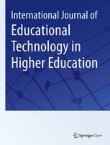International Journal of Educational Technology in Higher Education welcomes submissions to the thematic series "More than tools? Critical perspectives and alternative visions of technology in higher education"
Digital Technology has been promoted as a crucial element for the improvement of contemporary education, and one of the key challenges to face Higher Education all over the world. Universities are now awash with digital systems and devices, with the promise of improving the performance of students and educators by enhancing learning, boosting enrolment, retention and completion rates. Individuals everywhere increasingly engage in higher education along digital lines. In parallel, educational technology is now a multi-billion dollar industry – involving global technology corporations in local educational provision and practice. The need to ask critical questions of the relationship higher education and technology is more pressing than ever.
Against this background, this thematic series looks at the impact of digital technology on higher education through a deliberately critical lens. We are interested in moving beyond notions of technology as an instrumental issue that is neutrally implemented, and instead develop more nuanced analyses by problematizing the claims and assumptions surrounding higher education in a digital age.
Recent critical scholarship of technology has encompassed many study area and research topics. These include the understanding of new literacies and personal competencies under the view of media and arts education, philosophy of education, community education, critical pedagogy and activist education. There are also burgeoning critiques of technology within feminist and gender studies literatures, policy studies, and emerging interest in critical realist, socio-material and post-humanist directions.
The aim of this special issue to foreground these approaches in terms of discussions of higher education and technology.
Potential topics include but are not limited to:
- Cultural, philosophical or political analyses of how digital technologies are actually being used –or not- in higher education settings (equality, diversity, openness, democracy, and so on);
- Alternative perspectives to the users’ experiences and views of digital technology, both within and beyond formal higher education settings;
- Digital technology and the reconfiguration of space, place, time and social relations in higher education contexts;
- Digital technology, personalization and socialization in higher education;
- Critical pedagogies and critical literacies for technological contexts: technologies as creators of subjectivities and legitimating factors of discourses and powers.
- Epistemological implications of digital technology in higher education; for example, what knowledge is promoted, how the flux of knowledge is changing, how technology impacts on professional knowledge
- Current pedagogical gaps that appear –and are currently being ignored - in the official proposals for integration of technology in higher education.
- Characteristics and personal implications of being a learner and/or teacher in contemporary technology-rich higher education contexts;
- Alternative research approaches to studying the implementation of digital technologies into higher education;
- Unintended and unexpected consequences of digital technology use – its seductions and pleasures as well as its problems and anxieties;
- Accounts of what can be really said to be ‘new’ about the use of digital technology in higher education – i.e., what is digital technology making possible that were not possible before; how are social relations being altered (if at all); can digital technology really be seen to constitute a new educational landscape, or does it more accurately describe a set of continuities from previous eras?
- Higher education and the changing nature of employment and the professions in the digital age.
Submission Instructions
Before submitting your manuscript, please ensure you have carefully read the submission guidelines for International Journal of Educational Technology in Higher Education. The complete manuscript should be submitted through the International Journal of Educational Technology in Higher Education submission system. To ensure that you submit to the correct thematic series please select the appropriate thematic series in the drop-down menu upon submission. In addition, indicate within your cover letter that you wish your manuscript to be considered as part of the thematic series on "More than tools? Critical perspectives and alternative visions of technology in higher education". All submissions will undergo rigorous peer review and accepted articles will be published within the journal as a collection.
Deadline for submissions: 1 August 2017
Guest Editors
Linda Castañeda, Universidad de Murcia, Spain
Linda Castañeda is an Associate Professor in the Department of Didactics and School Organization at the Faculty of Education at the University of Murcia. She is a full member of the Group of Research in Educational Technology (GITE) at the same university. Her research and teaching is focussed on the implementation and impact of technologies in the educational (teaching and learning) models, processes and practices. Information about Linda’s publications and work would be founded on her personal website http://www.lindacastaneda.com
Neil Selwyn, Monash University, Australia
Neil Selwyn is a professor in the Faculty of Education, Monash University. His research and teaching focuses on the place of digital media in everyday life, and the sociology of technology (non)use in educational settings. Dr. Selwyn is co-editor of the journal 'Learning, Media and Technology', and a regular keynote speaker at international conferences. Neil is a core member of the 'Learning with New Media ' research group within Monash. More information about his research on http://newmediaresearch.educ.monash.edu.au/lnm/prof-neil-selwyn/
Submissions will also benefit from the usual advantages of open access publication:
- Rapid publication: Online submission, electronic peer review and production make the process of publishing your article simple and efficient
- High visibility and international readership in your field: Open access publication ensures high visibility and maximum exposure for your work - anyone with online access can read your article
- No space constraints: Publishing online means unlimited space for figures, extensive data and video footage
- Authors retain copyright, licensing the article under a Creative Commons license: articles can be freely redistributed and reused as long as the article is correctly attributed
For editorial enquiries please contact educationaltechnologyjournal@springeropen.com.
Sign up for article alerts to keep updated on articles published in International Journal of Educational Technology in Higher Education - including articles published in this thematic series!
